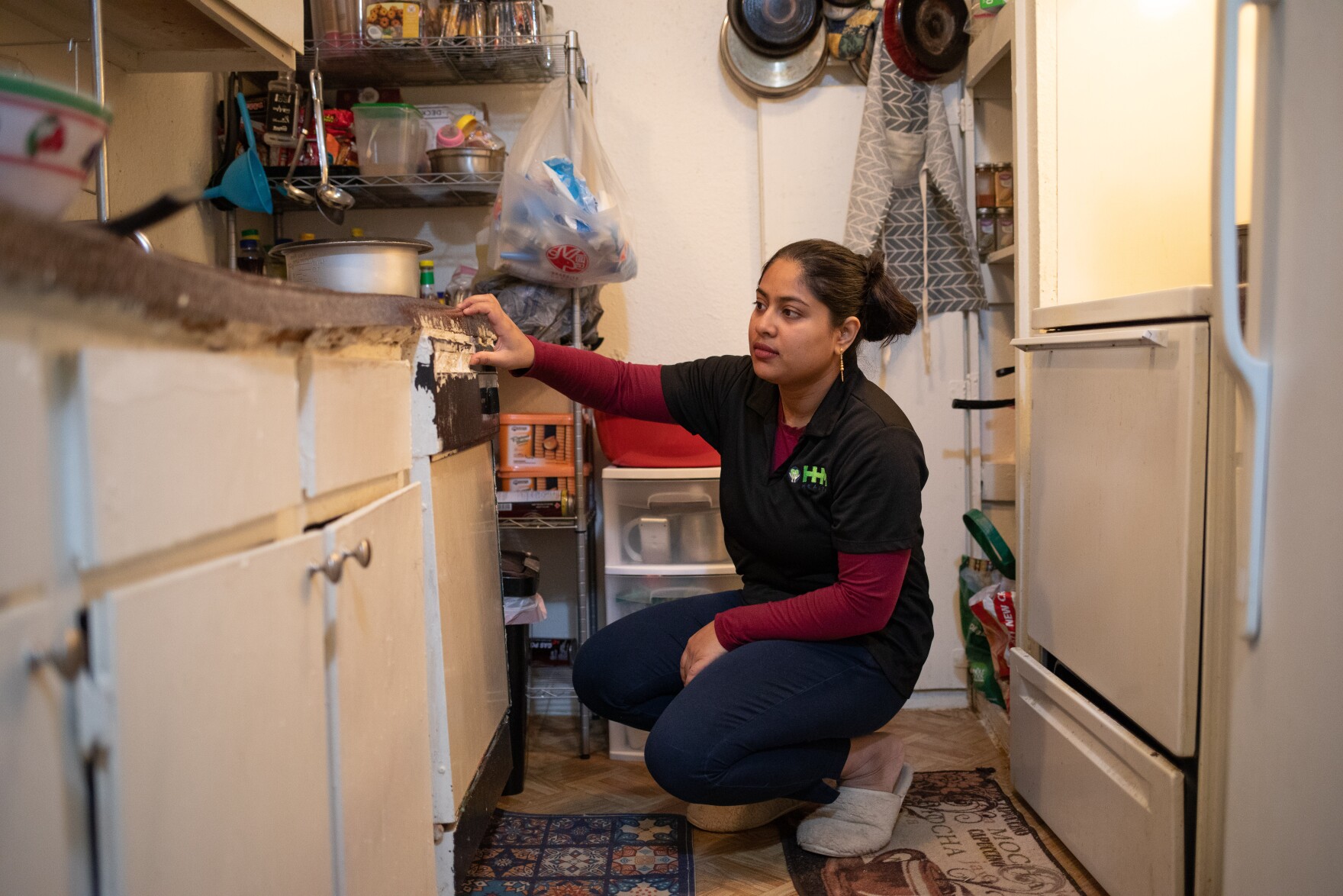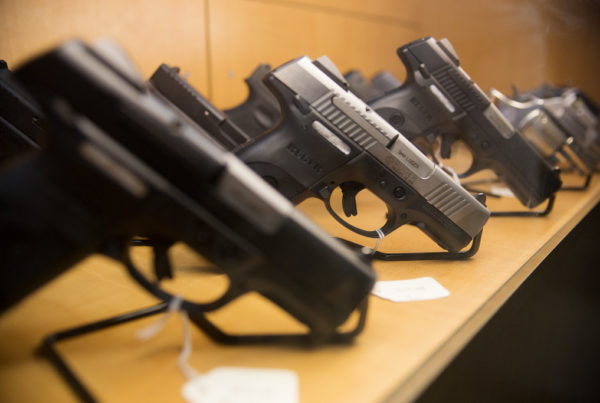“We cannot get rid of them. I think they already have this place all infested. There’s nothing I can do,” she said.
She describes other persistent problems: A leaking fireplace, and hot water and air conditioning that go out intermittently.
In December 2019, Yusof’s young family — part of Dallas’ growing Rohingya refugee community — moved into their one-bedroom apartment in the Vickery Meadow neighborhood. Since then, the management has sent workers to the apartment more than three dozen times to deal with problems.
Often, she said, things get fixed. Sometimes they don’t.
The kind of problems she detailed can be more than just eyesores. Medical experts say there are significant health consequences when tenants share their apartments with insects or rats, endure faulty plumbing and live with other problems that stem from inadequately maintained housing.
Such housing problems can be particularly bad for the elderly, the medically frail and young children.
The head of the company that manages Yusof’s apartment complex told KERA his team works to fix tenant complaints quickly and is executing a long-term improvement plan to buildings that are old and hadn’t been well-cared for by the previous owner.
Many apartment complexes in Vickery Meadow are showing their age. The neighborhood is a magnet for refugees and immigrants attracted by inexpensive rent, a more robust network of social services, and, often, people who speak their language and share their culture.
Vickery Meadow apartment complexes often date back to the 1970s, when it was a go-to location for upwardly mobile and mostly white singles. It transitioned into a lower-income neighborhood as the singles moved out, the apartment complexes aged, rents dropped and more diverse families moved in.
Now, Dallas code inspectors frequently cite Vickery Meadow apartment complexes for violations that could have serious health and safety consequences.
Just a couple miles from multi-million dollar homes occupied by some of Dallas’ most privileged, many of Dallas’ most vulnerable find themselves building new lives in a new country in aging apartments that can make them sick.
They live with conditions that can worsen asthma and heart disease, cause allergies or injuries, and create significant mental distress.
Health consequences
About 6% of housing units in Texas are considered “inadequate,” according to the latest American Housing Survey data from the U.S. Census Bureau. That means they have significant structural problems, inadequate heating, or plumbing that doesn’t work sufficiently. The research shows mice, rats or cockroaches had been found in more than a third of homes in Texas within a year of the latest survey.
Living conditions like these can cause a variety of health problems, according to the U.S. Office of Disease Prevention and Health Promotion:
- Water leaks, dirty carpets, and pest infestations can lead to mold, mites and other allergens that worsen chronic health conditions.
- Pests can carry diseases and their feces or dander can contribute to respiratory problems.
- Extreme indoor temperatures can exacerbate heart conditions and causes other problems that can increase mortality among elderly or other vulnerable people.
- Lead paint in residences built before 1978 can impair brain and neurological development in children.
- Poorly built or maintained structures increase the risk of injuries and fires.
- And poor ventilation can expose a family to carbon monoxide, which can cause heart and brain damage, affect fetal development and even kill.
Just across the street from the Yusof family’s apartment are two apartment complexes — The Sunchase Square and The Ivy — that are at the center of a lawsuit filed by the City of Dallas. The complaint against Nuran, Inc., alleges a long list of city code violations that could endanger the health and safety of tenants, many of whom are refugees.
In court documents, Nuran disputed the city’s claims. KERA repeatedly requested an interview with Nuran representatives and also submitted written questions by email. An attorney for the company did not respond to the questions and did not sit down for interview.
At the Valenceo @ Midtown, where the Yusofs live, dozens of complaints to the city’s 311 service over the last five years allege rat and cockroach infestations, water leaks and backed up sewage, appliances that don’t work and inoperable heating or air conditioning units. A KERA review of code compliance records shows many complaints at the 45-year-old property that were confirmed, but also that the repairs ordered by the city were made.
Missing from that list of 311 complaints are the Yusof’s concerns. Yusof said she hasn’t been sure how to lodge a complaint with the city — or whether anything would be done if she did.
“Where am I living, why am I staying in such a bad place? But I have no choice, especially when I have a [lease] agreement with them. Leaving is not a good choice right now but it is like hell staying here,” she said. “I have no choice. I cannot afford for my kids to get a better space.”
The Valenceo apartments are operated by the Pallas Companies, which runs several other apartment complexes in Vickery Meadow. Ted Palles (the company’s name and his last name have different spellings) said his company specializes in turning around long-neglected properties by investing in improvements and attracting renters. He pointed to Valenceo’s 95% occupancy rate as a sign that residents overall are happy.
“You’d expect in any portfolio for there to be problems every single day, every single week. And this is what we deal with every single day, every single week,” said Palles, who also chairs the Midtown Improvement District, a property tax-funded organization focused on bettering quality of life in the Vickery Meadow neighborhood. “In the sense of the folks at Valenceo, I would say over the years it does get improvement.”
Yusof and her husband, Jamal, came to Dallas as refugees and joined a close-knit and growing Rohingya community. The Muslim minority in Myanmar has endured decades of persecution by the government there.
The couple and their two young children — 7-year-old Adam and 2-year-old Aqilah — moved into the Valenceo @ Midtown apartments last year when Rashidah’s mother and brother came to Dallas. Since then, her mother-in-law, brother-in-law and her sister-in-law’s family have also moved to the apartment complex.
Yusof likes having her extended family so close. But she said the four units the extended family occupies have presented a steady parade of problems including pest infestations, leaks, and other issues in their apartments since moving in.
“We just want to have a clean and [safe] place for sure. We just want to have a happy life. You just want to come home from work and relax,” she said. “You don’t want to have to deal with all of these rats and cockroaches.”
Tip of the iceberg
Sometimes it’s not easy to tie a patient’s symptoms to where they live, said Dr. Providence Uwimana, a family practice physician at the nonprofit HHM Health Clinic in Vickery Meadow.
“I know there are a lot of things that could be related but sometimes we’ll blame it on something else just because we don’t see the living conditions they’re in, and they’re not going to come and tell me about their living conditions,” Uwimana said.
Patients may feel too embarrassed to mention the cockroach infestation that might be causing their rash and breathing difficulties.
Those complaining of asthma may not think to mention mold or poor ventilation in their apartment when they see Dr. Uwimana, even though mold can cause more frequent and worsening asthma attacks.
And people settling into a new and unfamiliar place may not even know what’s triggering new allergy symptoms.
Uwimana works with a large refugee population. For some, given the conditions they lived in before the U.S., complaining about their current housing can feel ungrateful.
“If you’re in actual four walls with a toilet inside your house and a kitchen inside your house, that’s like a mansion where you came from,” she said.
Many don’t speak English well enough to find better options for their families, she said. They may not file complaints with the city’s code compliance department because they faced government persecution in their home countries and don’t trust authorities to help. Others worry they could be evicted if they complain.
But Uwimana said there can be serious mental health consequences to living with housing problems you can’t solve.
“You’re just stuck there, managing or living with these health issues,” she said. “There’s a psychological trauma that comes with it.”
‘An unfortunate situation’
Palles, whose company operates Valenceo, called the Yusof family’s issues an “unfortunate situation.” But he said the problems would be fixed if they were submitted properly to the management team.
His company took over the 282-unit complex in 2014. Its owners at the time were being sued by the city for being a public nuisance after a years-long push to force the owners to bring it into compliance with health and safety codes. At the time, Palles said, it was mostly empty and rife with criminal activity.
He described a long-term strategy for major repairs at Valenceo and several other apartment complexes his company operates in Vickery Meadow.
“That’s been a slow and organic process,” Palles said. “We go along the way and we take care of the biggest issues of the process when we first get to it. And as we proceed through, we end up with some bigger capital items that we will finish.”
Replacing roofs on each of the buildings is part of a long-term improvement plan at Valenceo. In the meantime, tenants report leaks. Palles said his workers fix leaks when tenants report them.
Palles said tenants are responsible for letting management know when they need maintenance work done. His staff said most work orders are completed within a day of being submitted.
Asked about the dozens of code complaints filed by tenants at the Valenceo since 2018, Palles pointed to the condition the apartments were in when they were purchased. He said his team has been making constant improvements to the property. Tenants often call 311 instead of asking management to fix the problems, Palles said.
Members of his management team also suggested that language barriers can prevent people from communicating their maintenance needs.
‘I can’t even sleep’
For Yusof, language is not a challenge. She works as a translator at the HHM Health clinic and speaks four languages. She said she’s lodged numerous complaints with the apartment management.
Palles shared a list of dozens of work orders for repairs to Rashidah Yusof’s apartment. Yusof said some of the problems got fixed, though not always quickly.
When a burner on her electric stove started spitting flames, it took about a week to fix, she said. She bought a butane camp stove so she could keep feeding her family in the meantime.
Other issues, she said, remain. The family still keeps a pot near the fireplace because it leaks, soaking her rugs and leaving a mess to clean up.
And, she said, there are always the bugs. She describes the revulsion when a bug falls into her hair while cooking dinner and the air fresheners she tossed out because they attracted swarms of the insects.
Yusof said the dishwasher hasn’t worked since the day they moved in. That’s not her big complaint. She prefers to wash dishes by hand. But she said the defunct dishwasher appears to be home to a major cockroach infestation. Her husband sealed it up with caulk — which held them back for a while — but the seals aren’t holding.
“At night, I can’t even sleep sometimes thinking about it. The kitchen is my favorite place. I cook for my kids, I do baking. So when something is wrong with that and I still have to cook, that’s going to bring me tears,” she said.
Palles’ property managers said every building at the complex is routinely treated for insects twice a year — spraying inside every unit unless a tenant declines or there are pets inside — and that exterminators are called in on a case-by-case basis if a tenant complains of cockroaches. They detailed efforts to retain a pest-management company during the pandemic.
And they suggested tenants attract cockroaches by using too-large trash bags or not cleaning frequently enough.
Yusof said she’s only seen exterminators once since moving in, and the pest control strategy clearly isn’t working. She cleans constantly and is fastidious about taking out the garbage. She uses regular 13-gallon kitchen trash bags.
‘A great country’
Yusof said she feels like landlords in the Vickery Meadow neighborhood see refugees as easy money: They don’t speak English, they’re often not well-educated, and many won’t complain. If they leave, there are always more refugees.
“Many refugees come here [to Vickery Meadow]. I move out today, they’ll find someone tomorrow. Because people are still traveling, many refugees [are] coming to this country,” she said.
Yusof hears about all kinds of apartment problems from patients at the clinic, as well as from friends and relatives in Vickery Meadow. It’s enough to make some of them question whether everything they’d heard about the U.S. is wrong, she said.
“It’s the United States. Like, we see it in TV, we see it in social media, ‘Oh this is a great country,’” she said. “Which, it is a great country.”
But housing that can cause health problems wasn’t part of the American Dream she and her husband — or her community — imagined as part of life in the U.S.














